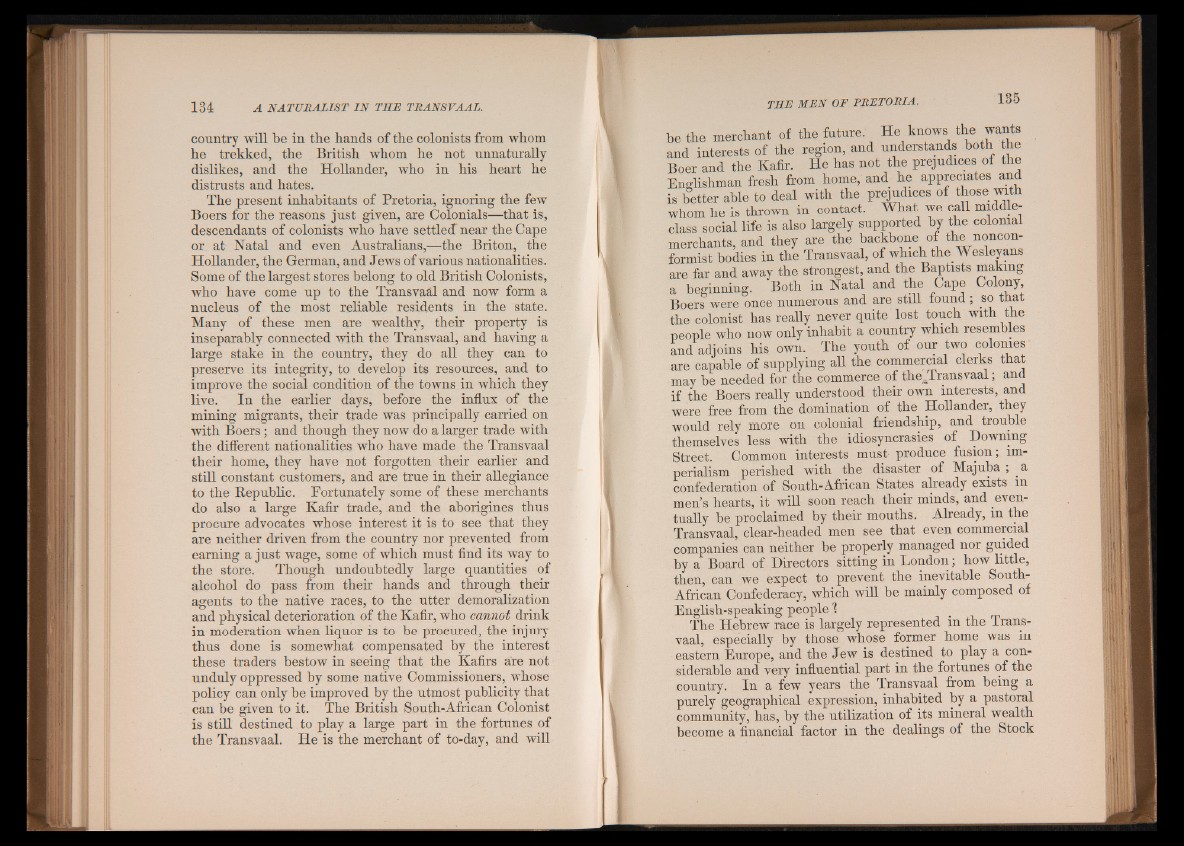
country will be in the hands of the colonists from whom
he trekked, the British whom he not unnaturally
dislikes, and the Hollander, who in his heart he
distrusts and hates.
The present inhabitants of Pretoria, ignoring the few
Boers for the reasons just given, are Colonials—that is,
descendants of colonists who have settled" near the Cape
or at Natal and even Australians,—the Briton, the
Hollander, the German, and Jews of various nationalities.
Some of the largest stores belong to old British Colonists,
who have come up to the Transvaal and now form a
nucleus of the most reliable residents in the state.
Many of these men are wealthy, their property is
inseparably connected with the Transvaal, and having a
large stake in the country, they do all they can to
preserve its integrity, to develop its resources, and to
improve the social condition of the towns in which they
live. In the earlier days, before the influx of the
mining migrants, their trade was principally carried on
with Boers; and though they now do a larger trade with
the different nationalities who have made the Transvaal
their home, they have not forgotten their earlier and
still constant customers, and are true in their allegiance
to the Republic. Fortunately some of these merchants
do also a large Kafir trade, and the aborigines thus
procure advocates whose interest it is to see that they
are neither driven from the country nor prevented from
earning a just wage, some of which must find its way to
the store. Though undoubtedly large quantities of
alcohol do pass from their hands and through their
agents to the native races, to the utter demoralization
and physical deterioration of the Kafir, who cannot drink
in moderation when liquor is to be procured, the injury
thus done is somewhat compensated by the interest
these traders bestow in seeing that the Kafirs are not
unduly oppressed by some native Commissioners, whose
policy can only be improved by the utmost publicity that
can be given to it. The British South-African Colonist
is still destined to play a large part in the fortunes of
the Transvaal. He is the merchant of to-day, and will
be the merchant of the future. He knows the wants
and interests of the region, and understands both the
Boer and the Kafir. He has not the prejudices of the
Englishman fresh from home, and he appreciates and
is better able to deal with the prejudices of those with
whom he is thrown in contact. What we call middle-
class social life is also largely supported by the colonial
merchants, and they are the backbone of the nonconformist
bodies in the Transvaal, of which the Wesleyans
are far and away the strongest, and the Baptists making
a beginning. Both in Natal and the Cape Colony,
Boers were once numerous and are still found ; so that
the colonist has really never quite lost touch with the
people who now only inhabit a country which resembles
and adjoins his own. The youth of our two colonies
are capable of supplying all the commercial clerks that
may be needed for the commerce of the^Transvaal; and
if the Boers really understood their own interests, and
were free from the domination of the Hollander, they
would rely more on colonial friendship, and trouble
themselves less with the idiosyncrasies of Downing
Street. Common interests must produce fusion; imperialism
perished with the disaster of Majuba ; a
confederation of South-African States already exists in
men’s hearts, it will soon reach their minds, and eventually
be proclaimed by their mouths. Already, in the
Transvaal, clear-headed men see that even commercial
companies can neither be properly managed nor guided
by a Board of Directors sitting in London; how little,
then, can we expect to prevent the inevitable South-
African Confederacy, which will be mainly composed of
English-speaking people %
The Hebrew race is largely represented in the Transvaal,
especially by those whose former home was in
eastern Europe, and the Jew is destined to play a considerable
and very influential part in the fortunes of the
country. In a few years the Transvaal from being a
purely geographical expression, inhabited by a pastoral
community, has, by the utilization of its mineral wealth
become a financial factor in the dealings of the Stock